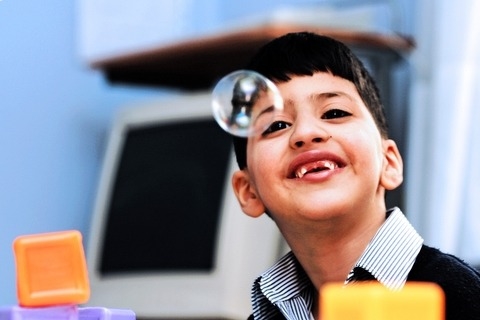Q: So What are the alarms for a parent? When should we raise an eyebrow?
Let intuition be your first alarm! As a parent we usually are intuitive if something is not okay with our children. The actual concern for us as therapists arises when others say, “you are over thinking”, “he is too small”, “you are not spending time” or worse – “wait for him/her to outgrow it, some kids take time!” Thus a lot of confusion sets in, making intervention attempts delayed.
But there are some key points we can monitor at home as parents and care givers –
- Delay in babbling
- Delay in walking
- Delay in head control
- Poor emotional bonding with mother or any other caregiver
- Poor stranger anxiety
- Poor eye-contact
- Does not explore the environment around
- Fixed with a certain behavior
- Running around and banging around, being excessively ‘clumsy’
If more than three of these symptoms are observed by parents, you might want to bring it to your pediatrician’s notice.
Q: You were telling us about a delayed Milestone? Can you elaborate on that?
Developmental milestones are a benchmark for a child’s growth through the years. For example, at 2 months, an infant smiles at the sound of your voice and follows you with their eyes as you move around a room. Similarly, at about 7 months, babies tend to respond to their name, or communicate by cooing among others.
Every milestone has an expected age, usually a range. For example, a lot of babies learn to walk by 10-11 months, while some go up to 15-16 months before they can find a balance. A delay is when a child does not reach a certain milestone by the upper limit of the expected age. Even though babies develop at their own pace, “every child should do certain tasks by a certain age.”
These tasks fall into five main categories:
- Gross motor skills, such as crawling and walking
- Fine motor skills, such as stacking blocks or coloring
- Language skills, including speech and comprehension
- Thinking skills
- Social interaction
Q: What kind of disorders can be identified at home, what are the key signs?
There are some disorders that can be identified at home at an early stage. But a mere identification, or a guess will not be worthwhile, unless a proper medical diagnosis and a detailed understanding is obtained from your pediatrician and a Child Psychologist. Early identification is helpful, only if the diagnosis and appropriate intervention is equally quick as well! Certain disorders whose symptoms you can watch out for, at home, are:
1. Cerebral palsy
Poor body control (gross motor, fine motor and neck), poor muscle tone, swallowing and feeding difficulty, poor facial muscle tone, and other similar symptoms
2. Autism
No social smile, in their own world, poor eye contact, and no response when name is called out
3. ADHD
Difficulty in focusing or continuing with a given task, always on the go, slow learner, bumps a lot, runs around almost continuously, finds it difficult to take notes from the board in class
4. Learning Disability
Difficulty with identification and learning numbers, alphabets and letters, overall speech problems and delay; or difficulty in answering questions after a story has been narrated, might show indications for learning disability. These symptoms are better identified after a discussion with school teachers, wherein these symptoms resonate in school learning set up as well.
Q: When should a parent really Panic?
Hahaha, ideally, NEVER!
I understand that the moment the parent feels that my child is not performing as per his age, the panic sets in immediately along with it. As a first step, you should ideally get in touch with your pediatrician first and discuss your doubts. Let them guide you on from there, instead of waiting for ‘the right time to come’ or ‘give time to pick up speed’. Then get in touch with professionals working with children like Developmental psychologist, Child psychologist, Psychiatrist among others. Once you understand the difficulty, get started immediately.
Often it is seen that parents take time to take the first step because of various reasons. Sometimes they feel they are judged very easily for small things, “oh he wears diapers at night”, “Is she still on the bottle”, “you didn’t breast feed??”, “oh, he is not talking yet?” which actually intimidates mothers.
We need to understand that every child is different and every relationship is different. So one child’s ‘delay’ can possibly be another child’s ‘achieved on time’. It is for us to assess our children correctly without bias.
Children with special needs may have mild learning disabilities or profound cognitive impairment; developmental delays that catch up quickly or remain entrenched; occasional panic attacks or serious psychiatric problems – Labeling the problem clearly helps us get appropriate help and services, setting the right goals, and helping improve the state of the child as well as the family.
Let’s help each other in building a better community for children by accepting children the way they are and not how they should be.
About Hemanti Mangal, Co-founder, The Healing Nest
Hemanti Mangal is a child psychologist who loves to flip her hats as per the need of the situation. Sometimes you can see her as a therapist working with a child, sometimes she is a trainer, sometimes a friend, sometimes a counselor. Her most loved hat though, is what she puts on most of the times – the one of a Parent!
After she completed her Bachelors in Psychology (hons) from Delhi University and her Masters in Counseling Psychology from Amity University, she completed her Post Graduation Diploma in Child Guidance and Counseling from NIPCCD. She has an experience of over 8 years in dealing with children having special needs. Her venture, ‘The Healing nest’, shows her best side with children.
Source for Banner Image: indiacrunch.in


